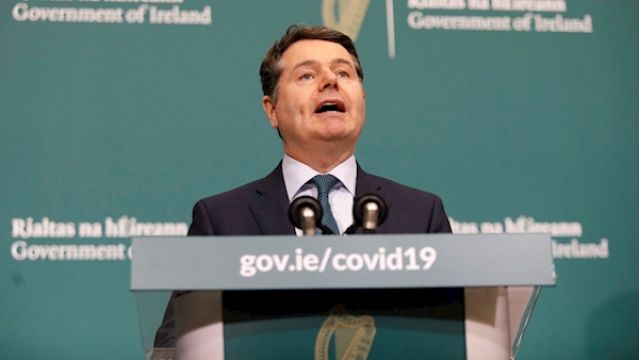Ministers and officials have been putting the finishing touches to Budget 2021, which will inject unprecedented resources into the economy in a bid to counteract the effects of the pandemic.
Minister for Finance Paschal Donohoe and Minister for Public Expenditure Michael McGrath completed the final details following a meeting with the three Coalition party leaders.
Budget 2021 is set to include a multibillion-euro stimulus package to support the economy in the wake of the impact of both the Covid-19 pandemic and Brexit.
The recovery fund will be worth between €4 and €5 billion.
A senior Government source told The Irish Times that the fund will be aimed at supporting businesses and sectors that have been heavily hit by the pandemic and those that are facing further challenges in the next year due to Brexit.
Working on my speech for tomorrow’s Budget. Looking forward along with @Paschald to giving a sense of hope to our country - backed up with very significant financial resources - that we will meet the huge challenges we face. We will get through this. pic.twitter.com/ceRjSjsesq
Advertisement— Michael McGrath (@mmcgrathtd) October 12, 2020
There will be a separate compensation scheme for businesses that have been forced to close due to Covid-19 restrictions, which will be paid out in weekly or monthly instalments.
So what do we know about the spending so far?
Incomes
No rises or falls in income tax are expected.
Up to €9 billion of the budget will go on social welfare, though the Pandemic Unemployment Payment (PUP) is unlikely to be restored to its previous level.
About 400,000 recipients of the PUP will receive the Christmas bonus this year, at a cost of €350 million. PUP recipients will only be entitled to the bonus if they have been on the scheme for four months.
The €5 increase in the State pension which has become the norm in recent years may not be given this year.
It is also reported that the carers grant will rise by €150 next year.
Housing
Senior sources have indicated to the Irish Times that an additional allocation will be made for affordable housing.
Negotiations are continuing on a scheme to see the State take part-ownership of homes, a stake which would be paid back over time, in an effort to make owning a property more accessible.
Construction and housing will likely be shielded from any policy or taxation changes amid fears it could endanger employment or tax revenues. There is also likely to be a €500 million investment in new social housing projects.
The Government's Help to Buy scheme is likely to be extended, while suggestions have been made that the level of Stamp Duty should also be looked at.
Supports
Today's budget is expected to include a new scheme to support businesses which have been forced to close due to Covid-19 restrictions.
The payments to assist with cash flow will allow them to claim expenses against income or corporation tax in advance while the business is closed, according to The Irish Times, but will be capped at €5,000 a week.
A support for full-time students is also expected, with third-level students set to be given €250 to help meet the cost of this academic year.
The total cost of the measure is in the region of €50 million and will likely be distributed by SUSI for those in receipt of grants or through colleges those who have paid their fees.
Healthcare and Covid-19
The spending of the budget will be in addition to extra Covid-19 spending already committed, which is already projected to add €8 billion to €9 billion to current expenditure next year.
Ministers are likely to announce over 1,000 new hospital beds, as well as new intensive care unit beds.
There will be provision for 300 new consultant doctors, to be offered a salary of €250,000 a year to work exclusively in the public system.
The budget is likely to contain funding for new investment in maternity services, after signals made by Minister for Health Stephen Donnelly on Sunday.
The child and family agency Tusla is expected to get a budget increase of about €50 million.
Spending on disability resources and services is also expected to increase by €100 million.
Additional funding will also be released to hire 600 extra gardaí, 1,000 special needs assistants, 400 special education teachers and 500 civilian staff to cope with the increased need due to the pandemic.
VAT cut
Sources have indicated that the VAT cut introduced in the July stimulus programme will not be extended and will expire in February.
However, a VAT reduction aimed at bolstering the hospitality sector is expected, according to the Irish Examiner, as pressure mounts on the Government to reduce the current rate of 13 per cent back to the 2018 rate of 9 per cent.
An extension of the commercial rates waiver up to next April is also likely.
Climate action
A rise in the carbon tax is expected.
Changes are also expected to make purchasing new high-emissions vehicles more expensive.
A home retrofitting scheme is also expected, which is aimed at reducing household energy consumption.
Music and arts
The performing arts sector is to receive “tens of millions” of euro in funding for small community venues and large commercial concert spaces, according to the Irish Examiner.
Grants of up to €10,000 for music and theatre venues are expected to be included in the budget in a programme described as a “lifeline for the industry”.
Deficit
Minister for Finance Paschal Donohoe said yesterday that the deficit for 2020 was expected to be €21 billion, warning that the projection would increase if further restrictions were reduced as a result of the pandemic.
Minister for Public Expenditure Michael McGrath said total expenditure this year would be more than €86 billion, the largest bill for running the State in its history, with about €16 billion of extraordinary pandemic-related measures.
All the money required to fund the deficit this year and next will be borrowed and added to the national debt, the Ministers confirmed.







